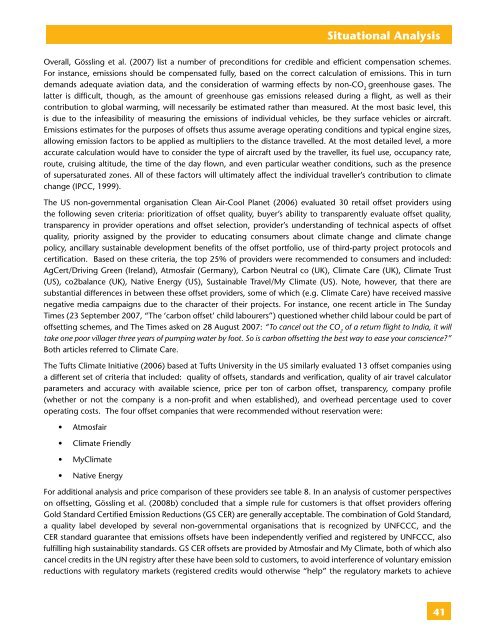Tourism & CC Challenges & Opportunities - Global Commons Institute
Tourism & CC Challenges & Opportunities - Global Commons Institute
Tourism & CC Challenges & Opportunities - Global Commons Institute
You also want an ePaper? Increase the reach of your titles
YUMPU automatically turns print PDFs into web optimized ePapers that Google loves.
Situational Analysis<br />
Overall, Gössling et al. (2007) list a number of preconditions for credible and efficient compensation schemes.<br />
For instance, emissions should be compensated fully, based on the correct calculation of emissions. This in turn<br />
demands adequate aviation data, and the consideration of warming effects by non-CO 2<br />
greenhouse gases. The<br />
latter is difficult, though, as the amount of greenhouse gas emissions released during a flight, as well as their<br />
contribution to global warming, will necessarily be estimated rather than measured. At the most basic level, this<br />
is due to the infeasibility of measuring the emissions of individual vehicles, be they surface vehicles or aircraft.<br />
Emissions estimates for the purposes of offsets thus assume average operating conditions and typical engine sizes,<br />
allowing emission factors to be applied as multipliers to the distance travelled. At the most detailed level, a more<br />
accurate calculation would have to consider the type of aircraft used by the traveller, its fuel use, occupancy rate,<br />
route, cruising altitude, the time of the day flown, and even particular weather conditions, such as the presence<br />
of supersaturated zones. All of these factors will ultimately affect the individual traveller’s contribution to climate<br />
change (IP<strong>CC</strong>, 1999).<br />
The US non-governmental organisation Clean Air-Cool Planet (2006) evaluated 30 retail offset providers using<br />
the following seven criteria: prioritization of offset quality, buyer’s ability to transparently evaluate offset quality,<br />
transparency in provider operations and offset selection, provider’s understanding of technical aspects of offset<br />
quality, priority assigned by the provider to educating consumers about climate change and climate change<br />
policy, ancillary sustainable development benefits of the offset portfolio, use of third-party project protocols and<br />
certification. Based on these criteria, the top 25% of providers were recommended to consumers and included:<br />
AgCert/Driving Green (Ireland), Atmosfair (Germany), Carbon Neutral co (UK), Climate Care (UK), Climate Trust<br />
(US), co2balance (UK), Native Energy (US), Sustainable Travel/My Climate (US). Note, however, that there are<br />
substantial differences in between these offset providers, some of which (e.g. Climate Care) have received massive<br />
negative media campaigns due to the character of their projects. For instance, one recent article in The Sunday<br />
Times (23 September 2007, “The ‘carbon offset’ child labourers”) questioned whether child labour could be part of<br />
offsetting schemes, and The Times asked on 28 August 2007: “To cancel out the CO 2<br />
of a return flight to India, it will<br />
take one poor villager three years of pumping water by foot. So is carbon offsetting the best way to ease your conscience?”<br />
Both articles referred to Climate Care.<br />
The Tufts Climate Initiative (2006) based at Tufts University in the US similarly evaluated 13 offset companies using<br />
a different set of criteria that included: quality of offsets, standards and verification, quality of air travel calculator<br />
parameters and accuracy with available science, price per ton of carbon offset, transparency, company profile<br />
(whether or not the company is a non-profit and when established), and overhead percentage used to cover<br />
operating costs. The four offset companies that were recommended without reservation were:<br />
• Atmosfair<br />
• Climate Friendly<br />
• MyClimate<br />
• Native Energy<br />
For additional analysis and price comparison of these providers see table 8. In an analysis of customer perspectives<br />
on offsetting, Gössling et al. (2008b) concluded that a simple rule for customers is that offset providers offering<br />
Gold Standard Certified Emission Reductions (GS CER) are generally acceptable. The combination of Gold Standard,<br />
a quality label developed by several non-governmental organisations that is recognized by UNF<strong>CC</strong>C, and the<br />
CER standard guarantee that emissions offsets have been independently verified and registered by UNF<strong>CC</strong>C, also<br />
fulfilling high sustainability standards. GS CER offsets are provided by Atmosfair and My Climate, both of which also<br />
cancel credits in the UN registry after these have been sold to customers, to avoid interference of voluntary emission<br />
reductions with regulatory markets (registered credits would otherwise “help” the regulatory markets to achieve<br />
41
















